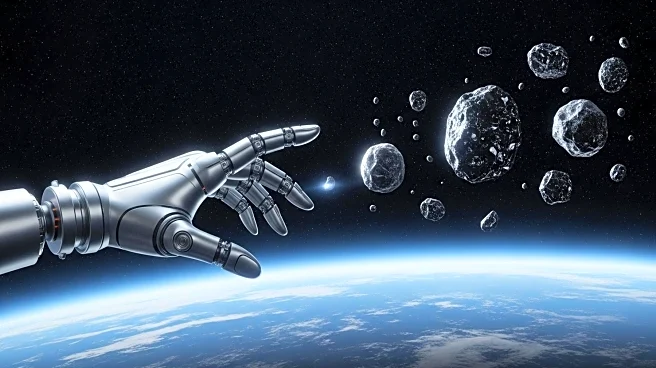What's Happening?
A recent study presented at the International Astronautical Congress in Sydney highlights the significant threat posed by space debris in low-Earth orbit (LEO). The study, led by Darren McKnight, identifies 50 pieces of space debris that are most likely to cause further collisions, potentially exacerbating the space junk problem. These objects, primarily consisting of defunct rocket bodies, are remnants from missions conducted before the year 2000. The debris travels at speeds of nearly 5 miles per second in a heavily trafficked region of LEO, between 700 and 1,000 kilometers above Earth. The study emphasizes that 76% of these objects were deposited in the last century, with 88% being rocket bodies. Russia and the Soviet Union account for the majority of these objects, followed by China, the United States, Europe, and Japan.
Why It's Important?
The accumulation of space debris poses a significant risk to current and future space operations. Collisions involving these objects could lead to the Kessler Syndrome, a scenario where the density of objects in LEO is high enough to cause a cascade of collisions, creating more debris and increasing the likelihood of further impacts. This could jeopardize satellites, space stations, and future missions, impacting industries reliant on satellite technology, such as telecommunications, weather forecasting, and global positioning systems. Addressing this issue is crucial for maintaining the sustainability of space activities and ensuring the safety of both crewed and uncrewed missions.
What's Next?
Efforts to mitigate space debris are likely to intensify, with potential strategies including the removal of high-risk objects from orbit. International cooperation will be essential to address this global challenge, as space debris does not recognize national boundaries. Space agencies and private companies may invest in technologies to track and remove debris, while policymakers could develop regulations to prevent further accumulation. The study's findings could prompt discussions on international agreements to manage space traffic and debris removal.
Beyond the Headlines
The issue of space debris also raises ethical and legal questions about the responsibility of nations and companies in maintaining the space environment. As space becomes increasingly commercialized, the need for clear guidelines and accountability measures will grow. The long-term sustainability of space activities depends on proactive measures to prevent and mitigate debris, ensuring that space remains a viable domain for exploration and economic development.











